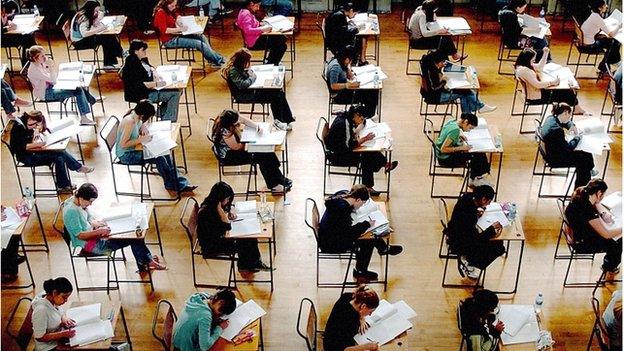A-level languages to be marked more fairly, says Ofqual
- Published

Language teachers say they have been complaining about inconsistent marking at A-level for over a decade
A-levels in modern foreign languages will be marked more fairly from next summer, the exams regulator, Ofqual, has promised.
The changes follow complaints from schools that too few students were getting top marks in language exams compared with other subjects.
Head teachers had described grading as "unpredictable and inaccurate".
The changes mean "those who should get the higher grades will do so", said chief regulator, Glenys Stacey.
A review of modern language A-level exams by Ofqual found questions were often ineffective in differentiating between students or identifying the most able.
Marking 'unclear'
Some mark schemes were unclear about what constituted a correct answer, said the report.
It also said some exam structures awarded too many marks for speaking and too few for writing.
From next summer, exam boards will be required to design questions with more thought to what answers will be awarded the highest marks.
Changes to the assessment of speaking will be required in later years.
"Exam boards need to make sure that assessments are designed in the right way to differentiate fairly between students," said Ms Stacey.
"It is vital that students, teachers and other users of these qualifications can have confidence in them and know that the results are fair. The changes we are proposing will do that."
Ofqual says the reforms will not require any change to the way subjects are taught or the way students are prepared for their exams.
Head teacher organisations from both private and state sectors welcomed the changes, in particular the commitment to take action in time for summer 2015.
Long-standing complaints
The Association of School and College Leaders, the National Association of Head Teachers and the HMC, representing top private schools, said language teachers had been complaining about "unexplained variability in marking" in A-level languages exams for over a decade.
Brian Lightman general secretary of ASCL, Russell Hobby general secretary of NAHT and Richard Harman, chairman of HMC, issued a joint statement welcoming Ofqual's action "on these historic unfairnesses".
They said the changes would help reverse "the long-standing decline in candidate numbers" for language A-levels.
"It is essential that the problem of the too few A* grades compared to other subjects is sorted out for next summer and that the lessons learned from this report are planned into the assessment of the reformed A-levels which are currently being designed."
Steve Parker, professor of German at the University of Manchester, said the changes would improve universities' confidence that "the best candidates get the highest grades".
- Published21 March 2013

- Published20 November 2013
